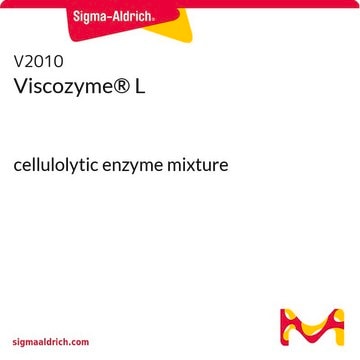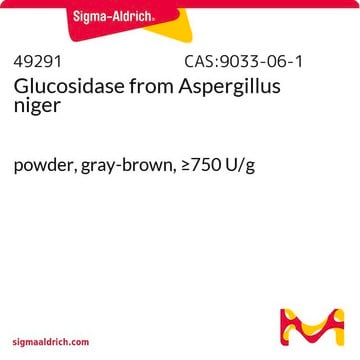SAE0020
Cellulase, enzyme blend
Sinónimos:
Cellic CTec2
Iniciar sesiónpara Ver la Fijación de precios por contrato y de la organización
About This Item
UNSPSC Code:
12352204
NACRES:
NA.54
Productos recomendados
General description
Cellulase is a member of glycoside hydrolase family and is produced by a number of cellulolytic microbes.
This product contains cellulases, ß-glucosidases, and hemicellulase, for the application of degrading cellulose to fermentable sugars. This product is effective on a wide variety of pre-treated lignocellulosic bimass materials, for converting the carbohydrates in these materials into simple sugars prior to fermentation, for application in biofuels research.
Application
Cellulase, enzyme blend has been used for the purpose of enzymatic hydrolysis.
Biochem/physiol Actions
Cellulase is responsible for the breakdown of insoluble plant polymer cellulosic substrates into soluble sugars, mostly cellobiose and glucose. It specifically catalyzes the hydrolysis of β -1,4 glucosidic bonds in cellulose. Animals do not naturally possess the ability to digest cellulose, but do so with the help of gut microorganisms.
Legal Information
A product of Novozyme Corp
signalword
Danger
hcodes
pcodes
Hazard Classifications
Resp. Sens. 1
Storage Class
10 - Combustible liquids
wgk_germany
WGK 3
Certificados de análisis (COA)
Busque Certificados de análisis (COA) introduciendo el número de lote del producto. Los números de lote se encuentran en la etiqueta del producto después de las palabras «Lot» o «Batch»
¿Ya tiene este producto?
Encuentre la documentación para los productos que ha comprado recientemente en la Biblioteca de documentos.
Los clientes también vieron
Qiulu Chu et al.
Biotechnology for biofuels, 14(1), 136-136 (2021-06-14)
Ethanol organosolv (EOS) pretreatment is one of the most efficient methods for boosting biomass saccharification as it can achieve an efficient fractionation of three major constituents in lignocellulose. However, lignin repolymerization often occurs in acid EOS pretreatment, which impairs subsequent
Model of acetic acid-affected growth and poly (3-hydroxybutyrate) production by Cupriavidus necator DSM 545.
Marudkla J, et al.
Journal of Biotechnology, 268, 12-20 (2018)
Zhe Ling et al.
Bioresource technology, 305, 123025-123025 (2020-03-03)
Discovering green solvents and their inner mechanisms for efficient deconstruction of lignocellulosic biomass recalcitrance are receiving growing interests. In this work, eco-friendly levulinic acid (LA) based deep eutectic solvents (DES) were proposed for pretreatment on moso bamboo by combining acetamide
Liwen He et al.
Frontiers in microbiology, 12, 690801-690801 (2021-09-14)
Vanillic acid (VA) is a phenolic acid derivative commonly found in plants and foods, with a pleasant creamy odor and pharmacologic activities, which is hypothesized to help improve silage fermentation. The silage profile of stylo silage ensiled with addition of
Angela S Machado et al.
Frontiers in bioengineering and biotechnology, 8, 826-826 (2020-08-09)
The ability of white-rot fungi to degrade polysaccharides in lignified plant cell walls makes them a suitable reservoir for CAZyme prospects. However, to date, CAZymes from these species are barely studied, which limits their use in the set of choices
Nuestro equipo de científicos tiene experiencia en todas las áreas de investigación: Ciencias de la vida, Ciencia de los materiales, Síntesis química, Cromatografía, Analítica y muchas otras.
Póngase en contacto con el Servicio técnico










